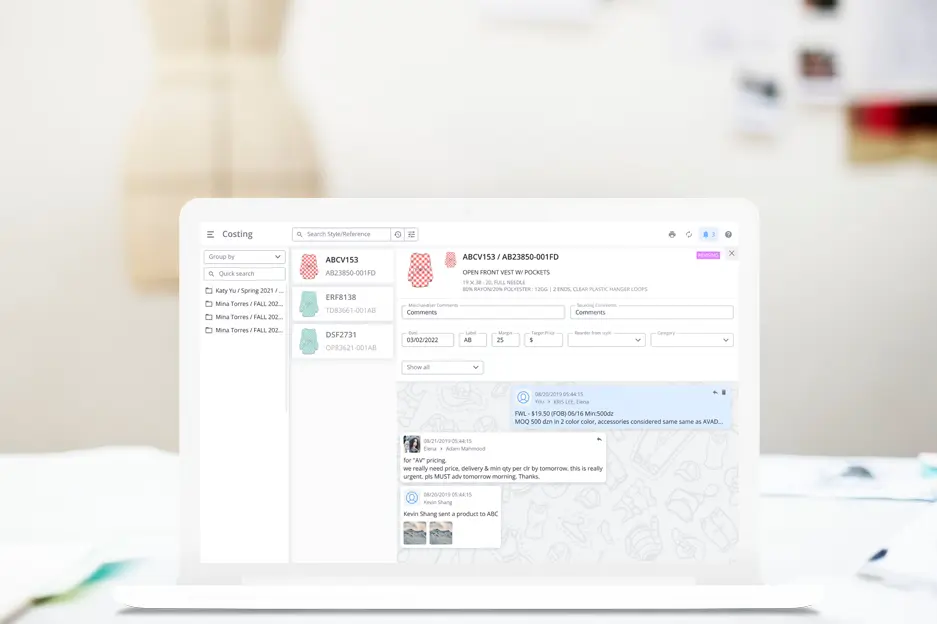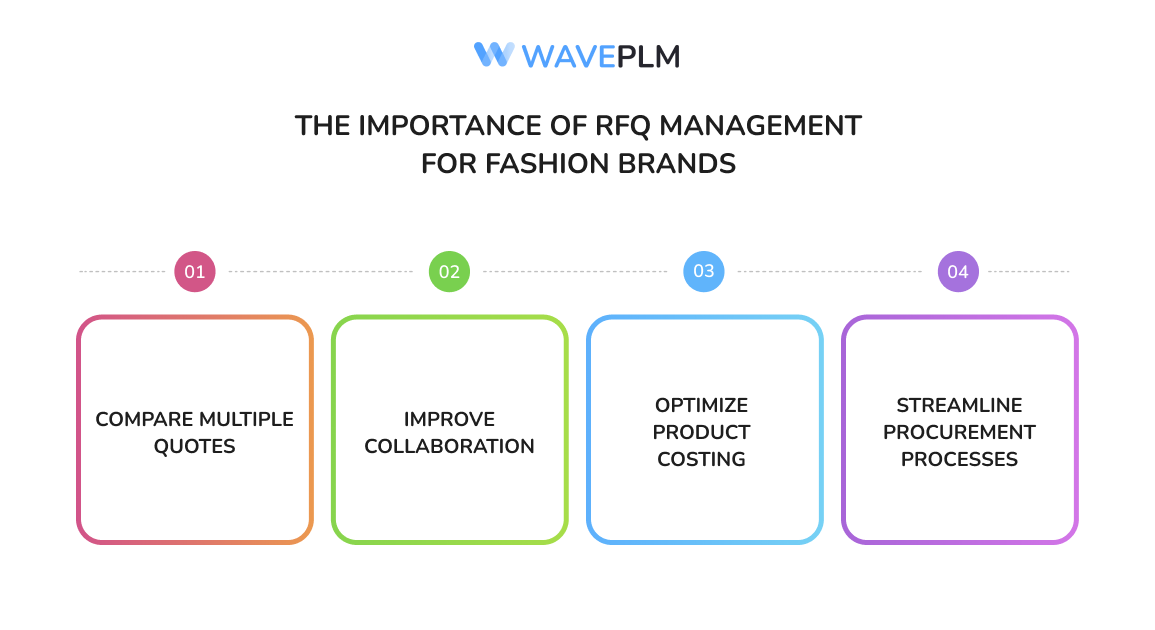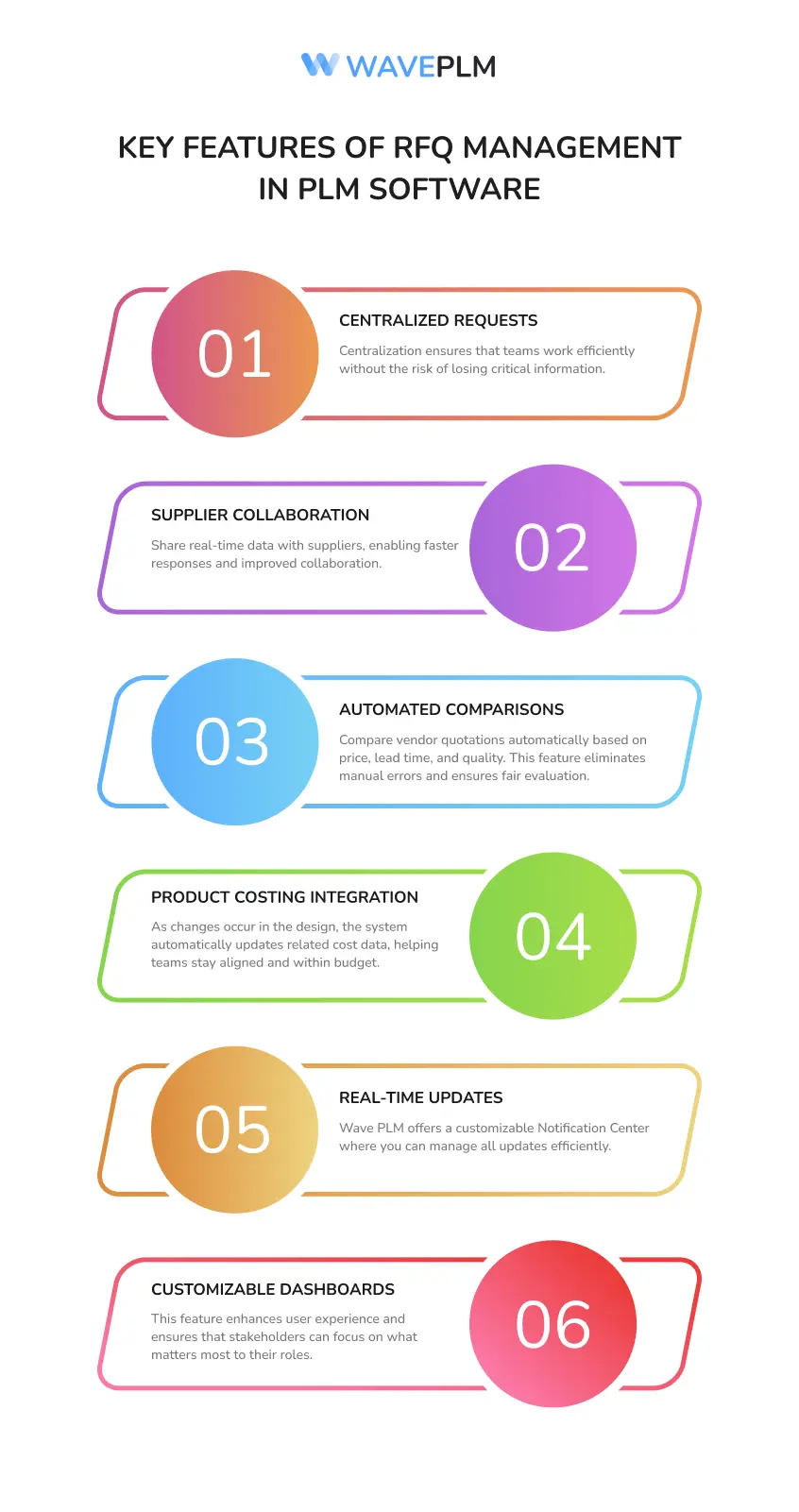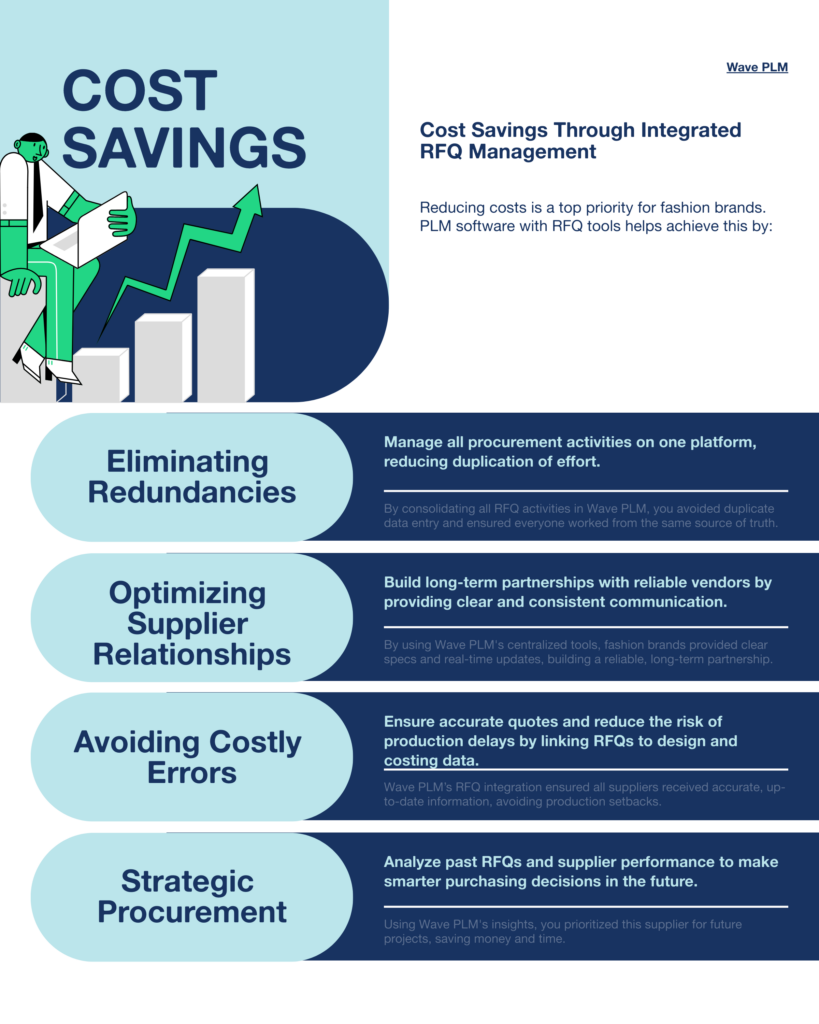
Managing requests for quotes (RFQs) is a critical step in the fashion supply chain. For fashion brands, transitioning from quoting to production involves precise coordination, accurate cost estimation, and supplier collaboration.
PLM software with built-in RFQ management makes these tasks easier. It provides a central platform to handle everything from quotes to final production. Let’s explore how this integration supports fashion brands and streamlines business processes.
What Is RFQ Management in Fashion?
RFQ management involves requesting, receiving, and comparing quotes from suppliers for specific products or services. In the fashion industry, this often includes materials, trims, manufacturing, and logistics. RFQ software makes this process easier. It allows brands to send requests, collect quotes, and review supplier responses all in one place.
PLM software with RFQ tools goes further by connecting these processes to product design, costing, and supply chain management. This fashion solution integration helps brands save time, reduce costs, and make informed decisions.
The Importance of RFQ Management for Fashion Brands
Effective RFQ management ensures that fashion brands can:
- Compare Multiple Quotes: Evaluate offers from different suppliers to select the best option.
- Improve Collaboration: Enhance communication with suppliers through centralized tools.
- Optimize Product Costing: Ensure accurate product cost estimation during the design and development stages.
- Streamline Procurement Processes: Manage all requests for quotes on one platform.
By using request-for-quote software, brands can avoid costly mistakes and delays. Integrating RFQ tools into PLM software amplifies these benefits by connecting procurement with the entire product lifecycle.

How PLM Software Integrates RFQ Management
PLM software serves as a central platform for managing product development, from initial design to final production. When RFQ management tools are part of this system, brands gain access to powerful collaboration and decision-making features.
Key Features of RFQ Management in PLM Software
- Centralized Requests: Create and manage RFQs for multiple products or services in one place. Centralization ensures that teams work efficiently without the risk of losing critical information.
- Supplier Collaboration: Share real-time data with suppliers, enabling faster responses and improved collaboration. Suppliers can access RFQ details, upload their quotations, and communicate directly with brands through the platform. This seamless collaboration fosters stronger partnerships.
- Automated Comparisons: Compare vendor quotations automatically based on price, lead time, and quality. This feature eliminates manual errors and ensures fair evaluation. Teams can focus on making informed decisions rather than sorting through spreadsheets.
- Product Costing Integration: Link RFQs directly to product designs for accurate cost estimation. As changes occur in the design, the system automatically updates related cost data, helping teams stay aligned and within budget.
- Real-Time Updates: Access real-time data to track the status of quotes and supplier negotiations. Wave PLM offers a customizable Notification Center where you can manage all updates efficiently. The Wave PLM app is free to use (available for iPhone and Android). It lets users get updates and access RFQ and other manufacturing process information anytime and anywhere. This ensures that we miss no critical updates.
- Customizable Dashboards: Tailor dashboards to display relevant data for different team members. This feature enhances user experience and ensures that stakeholders can focus on what matters most to their roles.

Benefits of Integrating RFQ Management
- Improved Collaboration: Team members and suppliers can work together seamlessly, reducing miscommunication and delays.
- Cost Reduction: Accurate cost estimation and supplier comparisons help reduce costs by avoiding overpriced quotes and ensuring better deals.
- Faster Timelines: Streamlined processes accelerate the transition from quoting to production, allowing brands to meet tight deadlines.
- Informed Decisions: Access to real-time data ensures brands make the best choices for their needs. The system’s analytics tools provide insights into supplier performance, cost trends, and more.
Streamlining Supply Chain Management with RFQ Tools
The fashion supply chain is complex, involving multiple vendors, materials, and production stages. RFQ management software within PLM helps brands maintain visibility and control over this process.
Enhancing Supply Chain Visibility
PLM software provides a centralized view of all supply chain activities. When RFQ tools are part of this system, brands can:
- Track vendor quotations and responses in real time, ensuring no delays in procurement decisions.
- Monitor cost trends and identify opportunities for cost savings, making procurement more strategic.
- Ensure transparency in procurement processes, fostering trust between brands and suppliers.
Supporting Vendor Selection
Choosing the right supplier is critical for maintaining quality and meeting deadlines. Request for quotation software simplifies this process by allowing brands to:
- Evaluate suppliers based on multiple criteria such as price, delivery timelines, and quality ratings.
- Compare quotes side by side, ensuring a comprehensive view of options.
- Select vendors that align with their cost, quality, and timeline requirements, reducing risks associated with unreliable suppliers.
Accelerating Product Development Timelines
In the fast-paced fashion industry, time is everything. Integrating RFQ management into PLM software helps brands move quickly from concept to production.
Faster Quoting Process
With automated RFQ tools, brands can:
- Generate and send requests in minutes, significantly reducing administrative overhead.
- Receive supplier responses faster, ensuring no time is wasted in the procurement phase.
- Reduce the time spent on manual comparisons by using automated analysis tools.
Linking Quotes to Product Design
RFQ tools in PLM software connect directly to product design data. This ensures that cost estimates reflect the latest design specifications, eliminating discrepancies and saving time during production planning. When changes occur, the system automatically updates associated RFQs, ensuring alignment between design and procurement.
Streamlining Business Processes
Integrated RFQ management reduces bottlenecks by connecting procurement to other key business processes. Teams can work more cohesively, with shared access to data and streamlined workflows. This ensures that every step, from design to manufacturing, aligns with overall business goals.
Real-Time Collaboration for Better Results
Effective communication between brands and suppliers is essential for successful RFQ management. PLM software with collaboration tools ensures all stakeholders stay informed and aligned.
Key Collaboration Features
- Shared Dashboards: Both brands and suppliers can access a shared platform for updates, feedback, and RFQ tracking. This transparency reduces the need for back-and-forth communication.
- Real-Time Notifications: Receive alerts for new quotes, supplier responses, or changes in status. The customizable notification center in Wave PLM ensures users only see updates relevant to their roles. The free Wave PLM app provides mobile notifications, making it easier to stay informed on the go.
- Document Sharing: Upload and share files like design specifications, cost breakdowns, and production schedules. This ensures all parties have access to the latest information.
These features improve customer service by ensuring timely responses and accurate information sharing. Suppliers appreciate the streamlined communication, while brands benefit from faster decision-making.
Cost Savings Through Integrated RFQ Management
Reducing costs is a top priority for fashion brands. PLM software with RFQ tools helps achieve this by:
- Eliminating Redundancies: Manage all procurement activities on one platform, reducing duplication of effort.
- Optimizing Supplier Relationships: Build long-term partnerships with reliable vendors by providing clear and consistent communication.
- Avoiding Costly Errors: Ensure accurate quotes and reduce the risk of production delays by linking RFQs to design and costing data.
- Strategic Procurement: Analyze past RFQs and supplier performance to make smarter purchasing decisions in the future.

Conclusion
PLM software with integrated RFQ management transforms how fashion brands handle requests for quotes. By streamlining procurement processes, improving supplier collaboration, and enhancing cost estimation, this technology supports brands in moving seamlessly from quote to production. For fashion companies looking to save time, reduce costs, and improve supply chain visibility, investing in PLM software with RFQ tools is a smart choice.
Adopting these tools ensures that every step—from product design to manufacturing—runs smoothly, helping brands stay competitive in today’s fast-paced fashion industry. With features like real-time updates, a free mobile app, and a customizable Notification Center, Wave PLM offers the ultimate solution for managing RFQs and driving business success.





Leave a Reply